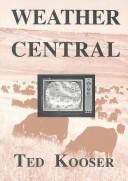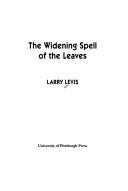Book
ISBN: 0814271545 0814251595 9780814271544 Year: 2009 Publisher: Columbus, Ohio : Ohio State University Press,
Abstract | Keywords | Export | Availability | Bookmark
 Loading...
Loading...Choose an application
- Reference Manager
- EndNote
- RefWorks (Direct export to RefWorks)
A volume of poetry about motherhood, travel, being.

ISBN: 0807101532 Year: 1977 Publisher: Baton Rouge Louisiana State university press
Abstract | Keywords | Export | Availability | Bookmark
 Loading...
Loading...Choose an application
- Reference Manager
- EndNote
- RefWorks (Direct export to RefWorks)
Book
ISBN: 1783948248 4064066221324 9700000035098 Year: 2014 Publisher: London : Copyright Group,
Abstract | Keywords | Export | Availability | Bookmark
 Loading...
Loading...Choose an application
- Reference Manager
- EndNote
- RefWorks (Direct export to RefWorks)
Book
ISBN: 1787370763 Year: 2017 Publisher: London : Copyright Group,
Abstract | Keywords | Export | Availability | Bookmark
 Loading...
Loading...Choose an application
- Reference Manager
- EndNote
- RefWorks (Direct export to RefWorks)
Henry Wadsworth Longfellow was born on February 27th, 1807 in Portland, Maine. As a young boy, it was obvious that he was very studious and he quickly became fluent in Latin. He published his first poem, "The Battle of Lovell's Pond", in the Portland Gazette on November 17th, 1820. He was already thinking of a career in literature and, in his senior year, wrote to his father: "I will not disguise it in the least... the fact is, I most eagerly aspire after future eminence in literature, my whole soul burns most ardently after it, and every earthly thought centers in it...." After graduation travels in Europe occupied the next three years and he seemed to easily absorb any language he set himself to learn. On September 14th, 1831, Longfellow married Mary Storer Potter. They settled in Brunswick. His first published book was in 1833, a translation of poems by the Spanish poet Jorge Manrique. He also published a travel book, Outre-Mer: A Pilgrimage Beyond the Sea. During a trip to Europe Mary became pregnant. Sadly, in October 1835, she miscarried at some six months. After weeks of illness she died, at the age of 22 on November 29th, 1835. Longfellow wrote "One thought occupies me night and day... She is dead - She is dead All day I am weary and sad". In late 1839, Longfellow published Hyperion, a book in prose inspired by his trips abroad. Ballads and Other Poems was published in 1841 and included "The Village Blacksmith" and "The Wreck of the Hesperus". His reputation as a poet, and a commercial one at that, was set. On May 10th, 1843, after seven years in pursuit of a chance for new love, Longfellow received word from Fanny Appleton that she agreed to marry him. On November 1st, 1847, the epic poem Evangeline was published. In 1854, Longfellow retired from Harvard, to devote himself entirely to writing. The Song of Haiwatha, perhaps his best known and enjoyed work was published in 1855. On July 10th, 1861, after suffering horrific burns the previous day. In his attempts to save her Longfellow had also been badly burned and was unable to attend her funeral. He spent several years translating Dante Alighieri's Divine Comedy. It was published in 1867. Longfellow was also part of a group who became known as The Fireside Poets which also included William Cullen Bryant, John Greenleaf Whittier, James Russell Lowell, and Oliver Wendell Holmes Snr. Longfellow was the most popular poet of his day. As a friend once wrote to him, "no other poet was so fully recognized in his lifetime". Some of his works including "Paul Revere's Ride" and "The Song of Haiwatha" may have rewritten the facts but became essential parts of the American psyche and culture. Henry Wadsworth Longfellow died, surrounded by family, on Friday, March 24th, 1882. He had been suffering from peritonitis.

ISBN: 0822979284 0822937964 082295527X 9780822979289 9780822955276 9780822937968 Year: 1994 Publisher: Pittsburgh : University of Pittsburgh Press,
Abstract | Keywords | Export | Availability | Bookmark
 Loading...
Loading...Choose an application
- Reference Manager
- EndNote
- RefWorks (Direct export to RefWorks)

ISBN: 0822979276 0822954540 9780822979272 0822936755 9780822936756 9780822954545 Year: 1991 Publisher: Pittsburgh : University of Pittsburgh Press,
Abstract | Keywords | Export | Availability | Bookmark
 Loading...
Loading...Choose an application
- Reference Manager
- EndNote
- RefWorks (Direct export to RefWorks)
Book
ISBN: 1280696850 9786613673817 0809385783 9780809385782 9781280696855 9780809329984 0809329980 6613673811 Year: 2010 Publisher: Carbondale, Ill. Edwardsville, Ill. Crab Orchard Review :Southern Illinois University Press
Abstract | Keywords | Export | Availability | Bookmark
 Loading...
Loading...Choose an application
- Reference Manager
- EndNote
- RefWorks (Direct export to RefWorks)
In this stunning continuation to the poetry collection A Murmuration of Starlings, dedicated to those who lost their lives during the Civil Rights movement, Jake Adam York presents another set of searing portraits of these martyrs-men whose murders haunt America's history. These elegiac and documentary poems seek justice and understanding for such sacrifices as Mack Charles Parker, lynched in Mississippi in 1959, his body disposed of in the waters of the Pearl River; Charles Eddie Moore and Henry Hezekiah Dee, abducted into the depths of the Homochitto Forest, beaten, and drowned in the Missis
Book
ISBN: 0809332744 9780809332748 0809332736 9780809332731 1299906605 Year: 2013 Publisher: Carbondale
Abstract | Keywords | Export | Availability | Bookmark
 Loading...
Loading...Choose an application
- Reference Manager
- EndNote
- RefWorks (Direct export to RefWorks)
Book
ISBN: 0809332795 9780809332793 9780809332786 0809332787 1299906583 Year: 2013 Publisher: Carbondale : Crab Orchard Review : Southern Illinois University Press,
Abstract | Keywords | Export | Availability | Bookmark
 Loading...
Loading...Choose an application
- Reference Manager
- EndNote
- RefWorks (Direct export to RefWorks)
Book
ISBN: 0809333260 9780809333264 1306452481 9781306452489 9780809333257 0809333252 Year: 2014 Publisher: Carbondale
Abstract | Keywords | Export | Availability | Bookmark
 Loading...
Loading...Choose an application
- Reference Manager
- EndNote
- RefWorks (Direct export to RefWorks)
The poems in this captivating collection weave beauty with violence, the personal with the historic as they recount the harrowing experiences of the two hundred thousand female victims of rape and torture at the hands of the Pakistani army during the 1971 Liberation War. As the child of Bangladeshi immigrants, the poet in turn explores her own losses, as well as the complexities of bearing witness to the atrocities these war heroines endured. Throughout the volume, the narrator endeavors to bridge generational and cultural gaps even as the victims recount the horror of grief and p

 Search
Search Feedback
Feedback About UniCat
About UniCat  Help
Help News
News